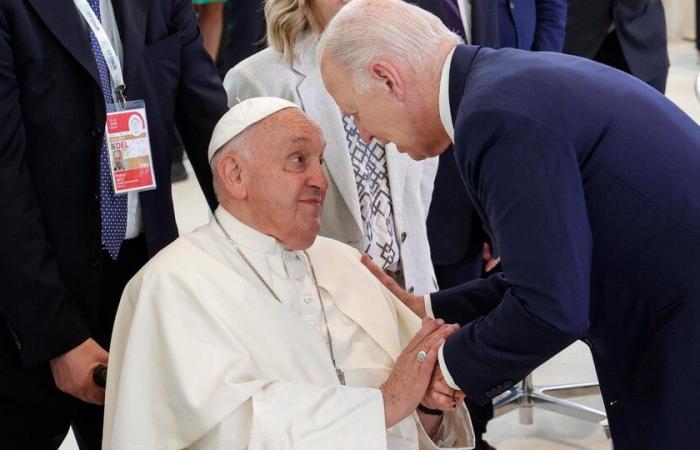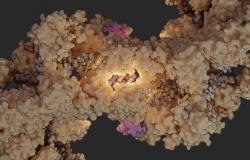
Franciscothe Pope who continues to break not only religious, but also political and cultural molds, sat down on June 14 at the G7 summit table in Borgo Egnazia (Apulia), in southern Italy, to debate on that stage the topic of artificial intelligence (AI). Jorge Bergoglio described AI as “an extremely powerful instrument” and said that we are not just talking about scientific progress but We are facing “a cognitive-industrial revolution that will contribute to the creation of a new social system characterized by complex epochal transformations.”
Consequently, in line with what has been his teaching since he settled in the Vatican, the Pope warned that in the face of this reality it is necessary to resort to ethics as a value that frames these advances from a human perspective. “Only if their vocation at the service of humanity is guaranteed, will technological instruments reveal not only the greatness and unique dignity of the human being, but also the mandate that the latter has received to ‘cultivate and care’ for the planet and all its inhabitants. ”Francisco said. And he stressed before rulers of world powers, among whom was also the president of the United States, Joe Bidenthat “talking about technology is talking about what it means to be human and, therefore, about our unique condition between freedom and responsibility, that is, it means talking about ethics.”
It is the first time that the highest authority of the Catholic Church is invited to this type of meeting, which only ratifies the significance that the figure of Francis has gained and maintains beyond the religious world and on the stage of international politics. Without abandoning the tone of his religious discourse, Bergoglio gets involved in the agenda and problems that concern people and international society.
AI is so important as a technological development, said Francisco, that “it is legitimate to assume that its use will increasingly influence our way of living, our social relationships and in the future, even the way we conceive our identity as beings.” humans”.
And in response to that, he stated, it is essential that politics act. “”Healthy politics,” said the Pope. Because “The technological paradigm embodied by artificial intelligence runs the risk of giving way to a much more dangerous paradigm, which I have already identified with the name of ‘technocratic paradigm’” and “We cannot allow a tool as powerful and indispensable as artificial intelligence to reinforce such a paradigm, but rather we must make artificial intelligence a bulwark precisely against its expansion.”
It is there, where “political action is urgent“said the Pope, without failing to remember that “for many today politics is a bad word, and (…) it cannot be ignored that behind this fact there are often errors, corruption, and the inefficiency of some politicians.” He also maintained that “to this are added strategies that seek to weaken it, replace it with the economy or dominate it with some ideology.” But – he questioned himself and asked the leaders present – if “Can the world function without politics? Can there be an effective path towards universal brotherhood and social peace without good politics?
The answer to the question was definitive: “No! Politics serves!” And he reiterated, once again, that “in the face of so many petty and immediate forms of politics […], political greatness is shown when, in difficult times, one acts based on great principles and thinking about the common good in the long term” despite the fact that “it is very difficult for political power to assume this duty in a national project and even more so in a project common for present and future humanity.” The Argentine president was also present in the auditorium, Javier Milei, whom the Pope had quickly greeted upon arriving at the summit headquarters.
In another passage of his speech Francisco recalled “the good use, at least of the advanced forms of artificial intelligence, will not be fully under the control of either the users or the programmers who defined their initial objectives at the time of developing them,” which “the machine can, in some ways and with these new means, choose through algorithms” and that “what the machine does is a technical choice between several possibilities and is based on well-defined criteria or statistical inferences.” Instead, The human being “not only chooses, but in his heart he is capable of deciding.”
For this reason, Francisco continued saying, “in the face of the wonders of machines, which seem to know how to choose independently, we must be very clear that It is always up to the human being to make the decision, even with the dramatic and urgent tones with which it sometimes occurs in our lives.”. Because, he added, “we would condemn humanity to a hopeless future if we took away people’s ability to decide for themselves and their lives, condemning them to depend on the choices of machines.” According to Francisco, “we need to guarantee and protect a significant space of human control over the election process used by artificial intelligence programs.” Because ““human dignity itself is at stake.”Bergoglio said at the G7.
Upon arriving at the summit, the Pope had been received by the President of the Council of Ministers of the Italian Republic, Giorgia Meloni. Before and after his speech at the G7 plenary session, Pope Francis maintained bilateral meetings with part of the presidents and heads of state present. In a first round he was with Kristalina Georgieva, general director of the International Monetary Fund, then with Volodymyr Zelensky, president of Ukraine, with the French president, Emmanuel Macron, and with the Canadian prime minister Justin Trudeau. In a second round of meetings Francis met with presidents Recep Tayyip Erdogan (Türkiye); Abdelmadjid Tebboune (Algeria); William Samoei Ruto (Kenya); Joe Biden (United States); Luiz Inácio Lula da Silva (Brazil) and Narendra Modi, Prime Minister of India.
[email protected]





